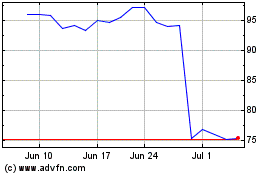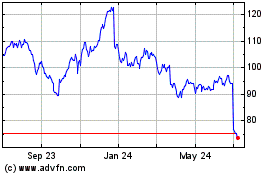By Rachel Bachman
ATLANTA -- Galen Rupp reasserted himself as the top U.S. men's
marathoner, and Aliphine Tuliamuk edged out her competitors to
finish as the top woman in Saturday's U.S. Olympic marathon trials,
a race that played out against the backdrop of an arms race in shoe
technology.
Rupp pulled away in the final miles on a blustery day, showing
the speed that won him the bronze at the 2016 Rio Olympics, to
finish in 2:09:20, more than 42 seconds ahead of Jacob Riley. Abdi
Abdirahman was third, and at age 43 will be the oldest American man
ever in an Olympic running event.
"This is my first marathon, I guess, that I've finished, since
having surgery a year-and-a-half ago," Rupp said of an Achilles
operation. "I'm just so thrilled to be representing the USA again
and heading back to Tokyo with these two other great guys."
Tuliamuk, a 30-year-old native of Kenya who attended Wichita
State, and third-place finisher Kenyan-born Sally Kipyego, who went
to Texas Tech, both became U.S. citizens in recent years. Kipyego
represented Kenya at the London 2012 Olympics, winning silver in
the 10,000 meters and finishing fourth in the 5,000.
Molly Seidel finished second in her debut at the marathon
distance. A four-time NCAA champion at Notre Dame, Seidel qualified
for the trials by running the Houston half-marathon.
The top three men and top three women qualify to represent the
U.S. at the Tokyo Games, which start July 24.
All three male qualifiers and the third-place female finisher
wore shoes from Nike's controversial Vaporfly line, which feature
thick soles and a carbon-fiber plate. Vaporflys made their debut as
prototypes in the 2016 U.S. marathon trials, drew complaints from
critics who said they gave runners an unfair advantage and spurred
competitors to create their own versions.
The top two men Saturday wore the Nike Alphafly, the most recent
model in the line, which Nike offered free to all competitors at
the trials. Abdirahman wore an earlier Vaporfly model.
Riley, the men's second-place finisher, didn't have a shoe
sponsorship and chose to run in Nike Alphaflys.
"I would prefer not to think that my presence on this team is
due to having a better shoe," said Riley, adding that he was in the
best shape of his life. "But I think there's no question that
plated shoes are kind of changing the face of the game. I think if
you're not in one of those, whatever brand it is, you're probably
giving yourself a disadvantage. And there's probably no way to
argue against that, at this point."
Riley noted, however, that the top two women finishers weren't
wearing Nikes. Tuliamuk wore Hoka One One's yet-to-be-released
Rocket X shoes, which have a carbon-fiber plage, and Seidel wore
Sauconys. Kipyego wore Nike's NEXT%, an earlier Vaporfly shoe.
Two of Nike's top sponsored female runners weren't factors in
the race. Amy Cragg, who ran in the 2016 Olympics marathon,
withdrew days earlier due to illness. Jordan Hasay, one of the
fastest women in the field, has struggled with injuries and
finished 26th.
Trials runner Sarah Sellers said she dropped a sponsorship from
another shoe company a month ago so she could wear Alphaflys.
"I feel like they made a difference, for sure," said Sellers,
who finished a higher-than-expected 11th place. "I hate to say
that, but I think they did make a difference."
Two surprising nonqualifiers were two-time Olympian Des Linden
and Jared Ward, who finished sixth in the marathon at the 2016
Games. Ward, wearing Saucony's new carbon-fiber-plated shoe,
finished 27th on Saturday.
Ward's agent, Bob Wood, was asked about the effect of Nike's
shoe technology on the race. "Did it put people on the team? Yeah,"
he said. "Did it keep him off the team? No."
Linden, wearing the latest carbon-fiber-plated shoe from Brooks,
finished fourth. "It was an incredibly deep field, and I got beat
by athletes who were just better on the day," Linden said through
her agent, Josh Cox.
Until last year, Rupp was coached by Alberto Salazar, the famed
former marathoner and celebrated coach of the Nike Oregon Project.
Salazar received a four-year suspension for doping conduct last
September, and Nike dismantled the Oregon Project shortly after
that. Salazar is appealing the decision.
Rupp is now coached by Mike Smith, director of cross-country and
track and field at Northern Arizona University.
In all, 772 runners, including 511 women, qualified to race in
the trials, the largest-ever field. On Saturday, 565 made it to the
start line and finished.
Write to Rachel Bachman at rachel.bachman@wsj.com
(END) Dow Jones Newswires
February 29, 2020 19:37 ET (00:37 GMT)
Copyright (c) 2020 Dow Jones & Company, Inc.
Nike (NYSE:NKE)
Historical Stock Chart
From Mar 2024 to Apr 2024

Nike (NYSE:NKE)
Historical Stock Chart
From Apr 2023 to Apr 2024
